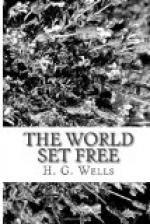Section 11
Now all this phase of gigantic change in the contours and appearances of human life which is going on about us, a change as rapid and as wonderful as the swift ripening of adolescence to manhood after the barbaric boyish years, is correlated with moral and mental changes at least as unprecedented. It is not as if old things were going out of life and new things coming in, it is rather that the altered circumstances of men are making an appeal to elements in his nature that have hitherto been suppressed, and checking tendencies that have hitherto been over-stimulated and over-developed. He has not so much grown and altered his essential being as turned new aspects to the light. Such turnings round into a new attitude the world has seen on a less extensive scale before. The Highlanders of the seventeenth century, for example, were cruel and bloodthirsty robbers, in the nineteenth their descendants were conspicuously trusty and honourable men. There was not a people in Western Europe in the early twentieth century that seemed capable of hideous massacres, and none that had not been guilty of them within the previous two centuries. The free, frank, kindly, gentle life of the prosperous classes in any European country before the years of the last wars was in a different world of thought and feeling from that of the dingy, suspicious, secretive, and uncharitable existence of the respectable poor, or the constant personal violence, the squalor and naive passions of the lowest stratum. Yet there were no real differences of blood and inherent quality between these worlds; their differences were all in circumstances, suggestion, and habits of mind. And turning to more individual instances the constantly observed difference between one portion of a life and another consequent upon a religious conversion, were a standing example of the versatile possibilities of human nature.




